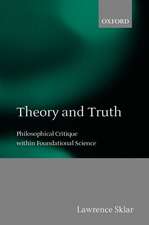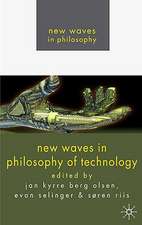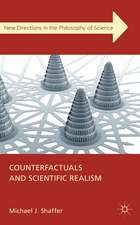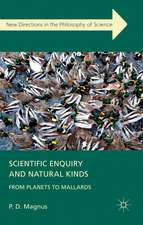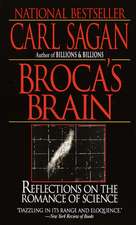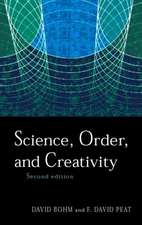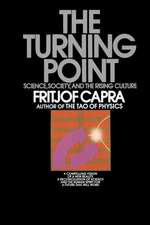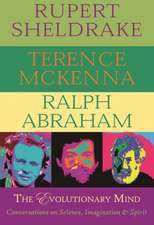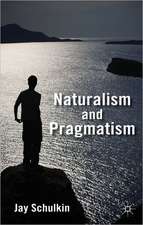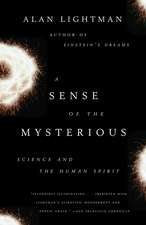The Nature of Scientific Thinking: On Interpretation, Explanation and Understanding
Autor J. Fayeen Limba Engleză Hardback – 9 apr 2014
Preț: 646.62 lei
Preț vechi: 760.73 lei
-15% Nou
Puncte Express: 970
Preț estimativ în valută:
123.77€ • 134.49$ • 104.03£
123.77€ • 134.49$ • 104.03£
Carte tipărită la comandă
Livrare economică 21 aprilie-05 mai
Preluare comenzi: 021 569.72.76
Specificații
ISBN-13: 9781137389824
ISBN-10: 1137389826
Pagini: 348
Ilustrații: XIV, 333 p.
Dimensiuni: 140 x 216 x 24 mm
Greutate: 0.59 kg
Ediția:2014
Editura: Palgrave Macmillan UK
Colecția Palgrave Macmillan
Locul publicării:London, United Kingdom
ISBN-10: 1137389826
Pagini: 348
Ilustrații: XIV, 333 p.
Dimensiuni: 140 x 216 x 24 mm
Greutate: 0.59 kg
Ediția:2014
Editura: Palgrave Macmillan UK
Colecția Palgrave Macmillan
Locul publicării:London, United Kingdom
Cuprins
Introduction to the Reader and Acknowledgements 1. Forms of Understanding 2. Understanding As Organized Beliefs 3. On Interpretation 4. Representations 5. Scientific Explanation 6. Causal Explanations 7. Other Tpes of Explanations 8. The Pragmatics of Explanation 9. Not Just Why-questions 10. A Rhetorical Approach to Explanation 11. Pluralism and The Unity of Science Literature Notes
Recenzii
“The Nature of Scientific Thinking provides a valuable resource both for those who share his basic strategy–who will find many topics to take up–and for those who do not–who will be able to identify where disagreement stems from. … provides a stimulating framework for thinking about these questions. It should be of interest both to those who tackle questions related to explanation from pragmatic approaches and to those working within formal-logical or ontic approaches.” (Lina Jansson, International Studies in the Philosophy of Science, Vol. 29 (2), 2015)
In sum, The Nature of Scientific Thinking offers a wide-ranging perspective on the natural sciences. Faye presents his views in discussion with existing accounts of explanation, understanding, representation and interpretation, and illustrates his theses with many detailed examples froma variety of disciplines.
-Henk W. de Regt, Notre Dame Philosophical Reviews
The book is very readable and informative and contains stimulating ideas. But the most valuable aspect is the convincing way in which the author argues in favour of a contextual-rhetorical approach to explanation.
-Xavier de Donato Rodríguez, Metascience
There is much to praise in Faye's book, especially his facility with examples from various sciences, including physics, biology, and zoology. He masterfully keeps within the parameters of his argument regarding scientific explanation without expanding his range too widely.
-Mark Tschaepe, Philosophy in Review
In sum, The Nature of Scientific Thinking offers a wide-ranging perspective on the natural sciences. Faye presents his views in discussion with existing accounts of explanation, understanding, representation and interpretation, and illustrates his theses with many detailed examples froma variety of disciplines.
-Henk W. de Regt, Notre Dame Philosophical Reviews
The book is very readable and informative and contains stimulating ideas. But the most valuable aspect is the convincing way in which the author argues in favour of a contextual-rhetorical approach to explanation.
-Xavier de Donato Rodríguez, Metascience
There is much to praise in Faye's book, especially his facility with examples from various sciences, including physics, biology, and zoology. He masterfully keeps within the parameters of his argument regarding scientific explanation without expanding his range too widely.
-Mark Tschaepe, Philosophy in Review
Notă biografică
Jan Faye is a philosopher of science at the University of Copenhagen, Denmark. He has written and edited a number of books in English as well as in Danish. Recently, he published After Postmodernism (2012), a book about the philosophy of the humanities, in which he argues that a pragmatic-naturalist understanding of humanistic research overcomes the traditional split in our views of the natural sciences and the humanities.

